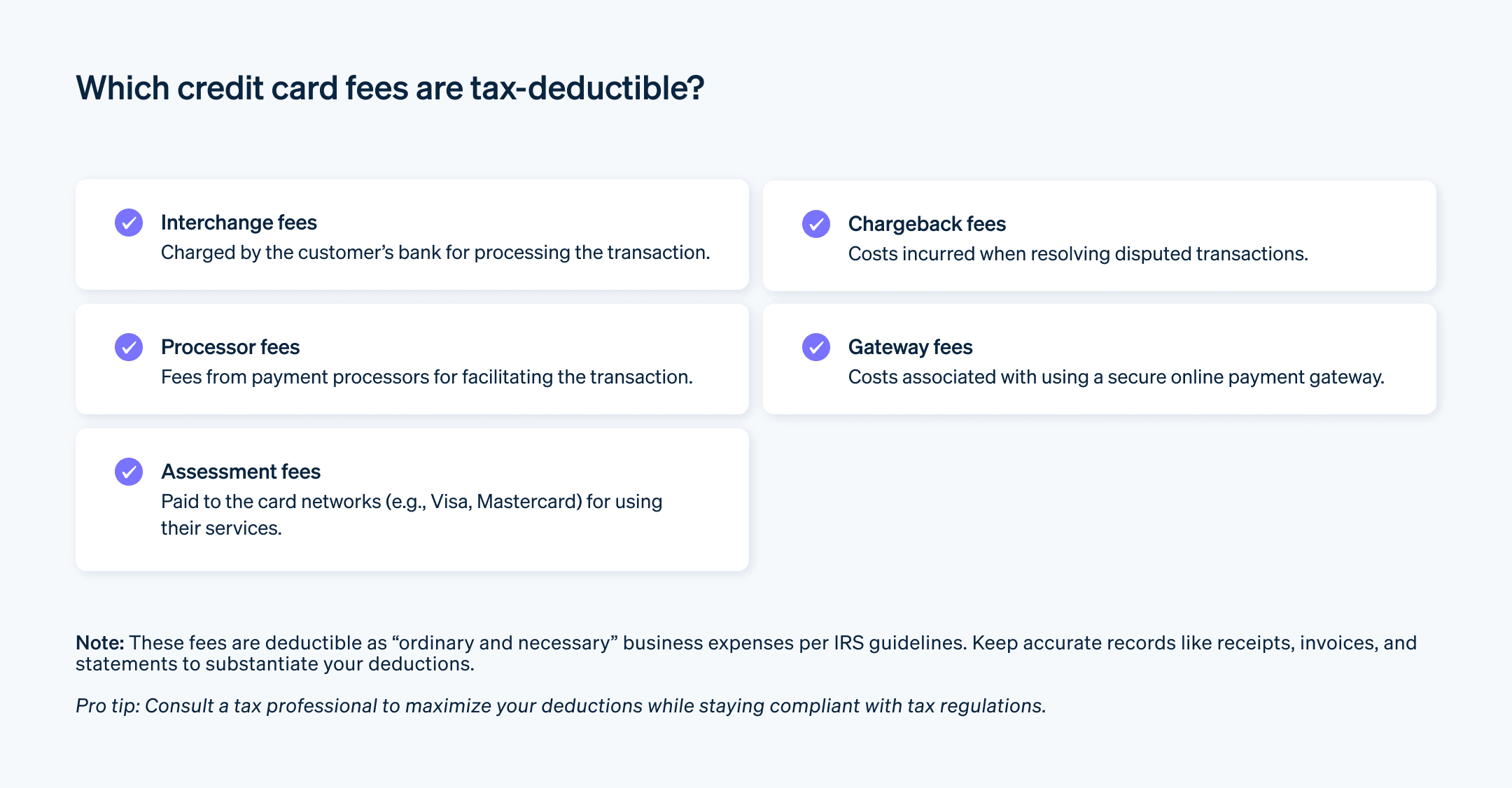电子支付方式已经获得了巨大的吸引力,数字支付的价值预计将在 2023 年达到近 9.5 万亿美元。根据普华永道的数据,从 2020 年到 2025 年,无现金支付的数量预计将增长超过 80%。随着越来越多的企业扩展他们的电子商务并接受更多的数字支付,了解支付处理费的税务影响对于最大限度地减少扣除额和降低整体纳税义务非常重要。
下面,我们将讨论支付处理费如何影响营业税,为您提供必要的知识,以获得您的企业有资格获得的每一项税收优惠。通过了解扣除这些费用的最佳实践,您可以完善您企业的税务策略,并最大限度地提高您的财务收益。
目录
- 什么是支付处理费?
- 支付处理费可以免税吗?
- 交易费用可以免税吗?
- 商户费用可以免税吗?
- 注销付款处理费的最佳实践
什么是支付处理费?
支付处理费是企业为使用支付处理服务而必须支付的费用,这有助于企业与其客户之间的交易。这些服务允许企业接受信用卡和借记卡、数字钱包、移动支付,以及其他电子支付。
这些费用通常涉及几个组成部分:
评估费
卡组织收取评估费用。它们比交换费低,但也是不可协商的。处理商加价
这是支付处理商收取的费用,支付处理商是为企业提供银行卡交易处理服务的公司。这笔费用通常是可以协商的,并且可能因处理商而异。
一些支付处理商还对退款 处理、支付网关访问或 PCI 合规性等服务收取额外费用。这些费用的确切金额可能因多种因素而异,例如交易类型(面对面与在线)、使用的卡类型(借记卡与信用卡、奖励卡与非奖励卡)以及业务性质。
支付处理费可以免税吗?
支付处理费通常被认为是一项必要的业务费用,包括美国在内的许多司法管辖区都是免税的。这包括信用卡交易、在线支付平台的费用,甚至与企业交易相关的银行费用。
美国国税局第 535 号出版物提供了可被视为可扣除业务费用的一般指南。以下是本文档中的一些要点:
普通和必要的费用
要获得扣除,业务费用必须既是普通且必要的。普通费用被定义为在您的贸易或业务中常见且被接受的费用。必要费用被定义为对您的贸易或业务有帮助且合适的费用。流动费用与资本支出
业务费用通常可在发生当年扣除。然而,如果费用产生的收益将持续一年以上(如购买设备),它可能必须资本化,并随着时间的推移折旧,而不是一次性扣除。个人与企业费用
只有企业费用的部分是可以扣除的。如果一项费用一部分是个人的,一部分是企业的,就需要适当地划分。
支付处理费是可以扣除的,因为它们被认为是开展业务的必要成本。这些费用通常属于独资业主的“银行费用”类别或附表C(表格 1040),业务损益中的类似项目,或公司、合伙企业或其他商业实体的纳税申报表中的相应部分。

交易费用可以免税吗?
通过支付处理商产生的交易费用通常可以免税,因为它们也被认为是与您的业务运营直接相关的普通和必要费用。通过扣除交易费用,您可以减少应税收入,从而节省税款。
如果您打算从企业税中扣除交易费用,请保留准确的交易费用记录。这意味着保留支付处理商提供的发票、收据和对账单作为已支付费用的证据。这些记录将有助于证实您的扣除额并支持您的税务申报。
商家费用可以扣税吗?
企业产生的商户费用通常可以免税。这些费用被认为是与您的业务运营直接相关的普通和必要费用。当您接受客户的信用卡付款时,您可以扣除支付处理商或商户服务提供商收取的费用,减少您的应税收入并增加节税。
同样,为确保准确扣除,请务必保留您产生的商家费用记录。保留您的支付处理商或商家服务提供商提供的发票、收据或对账单,作为已付费用的证明,以便在税务审计时为您的扣除提供支持。
值得注意的是,税法可能因您所在的司法管辖区而异。虽然联邦税法通常允许扣除支付处理费用,但最好还是咨询一下税务专业人士或会计师,他们熟悉你做生意的地方的具体税收规则和规定。根据您的业务情况获得个性化指导非常有价值,这可以确保您在遵守所有适用税法的同时最大限度地提高您的符合条件的扣除额。
注销付款处理费的最佳实践
在从税费中扣除付款处理费或为下一个报税季做准备时,您可以遵循以下最佳实践,以使报税时间更加顺畅:
准确的记录保存
请务必保留发票、收据和任何其他支持文件来证实您的扣除额。一个好的规则:如果您要扣除任何税款费用,您需要有证明文件来支持它。设置流程,建立流程,使积累和组织这些证明文件成为您业务运营的常规部分,这样您就不必在纳税时搜索它。将业务和个人开支分开
明确区分与付款处理相关的企业费用和个人费用。仅扣除与您的企业运营直接相关的费用。保持单独的银行账户或使用会计软件可以帮助正确跟踪和分类费用。正确分类费用
在报告付款处理费时,请使用适当的税表和类别。例如,在美国,独资经营者在附表C(表格1040) 的“银行费用”下报告这些费用。咨询税务专业人士
像这样的文章提供基本信息,而不是个性化指导,也不能替代税务专家的建议。与专门从事营业税的合格税务专业人士或会计师合作,帮助您应对复杂的税法,确定符合条件的扣除额,并完善您的税务策略。专业人士可以为您的企业提供量身定制的个性化建议,并确保遵守税收法规。保持消息灵通
税收政策不是经营企业一成不变的部分,它们往往每年都在变化。了解最新的相关税务法规和指导方针,订阅官方税务资源,参加研讨会或网络研讨会,并咨询知名人士,以了解可能影响支付处理费可抵扣性的变化。
本文中的内容仅供一般信息和教育目的,不应被解释为法律或税务建议。Stripe 不保证或担保文章中信息的准确性、完整性、充分性或时效性。您应该寻求在您的司法管辖区获得执业许可的合格律师或会计师的建议,以就您的特定情况提供建议。